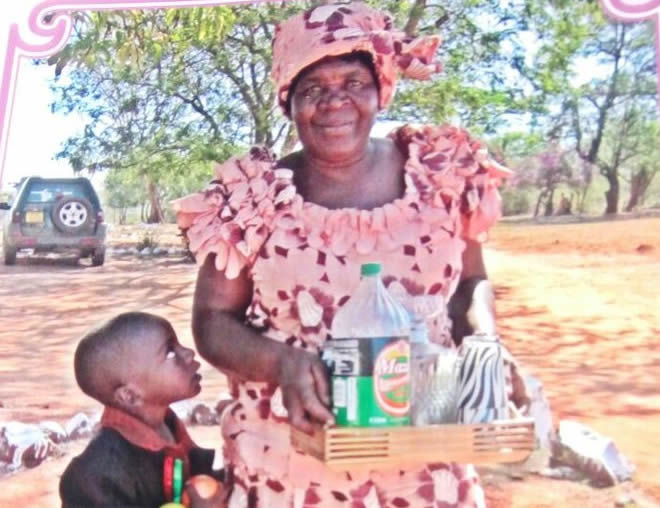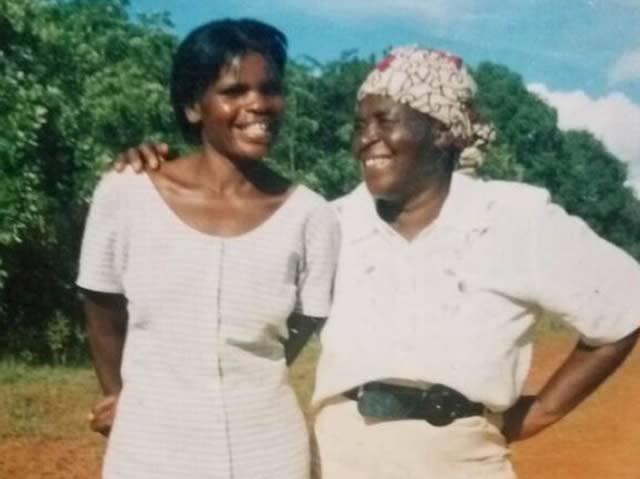
The ManicaPost

Freedom Mutanda and Sifelani Tonje Post correspondents
We thought it prudent to give a voice to our precious readers who make us keep on pen this column. We write to give readers fresh perspectives on the Second Chimurenga and give the identity that Zimbabweans need to have as members of the global community.
History makes a people and a country’s history shapes the future; there is no way we can sneer at our past. That is synonymous with claiming that the old woman with cracked feet is not your mother because you are wearing designer shoes.
Jonathan Marange sent a short message, ‘‘Uri kunyora.’’
Thank you Jonathan, we will continue to highlight the unsung heroes/ heroines of our time as we want them to be role models for our children.

Cde Charity Mutsumbeyi now an ECD teacher
From Bonda Mission, came the following message: Hats off to you Freedom and Sifelani. Thanks so much for your publications where you publish stories regarding our unsung heroes and heroines. I enjoy reading them for they re-live the sad memories and atrocities of the Ian Smith regime during the protracted war of liberation. It’s my fervent hope and utmost trust those who were young that time will have a gist or rough picture of the liberation struggle which brought about our loved independence. Produce more of those stories but may you extend your coverage to Mutasa district especially the Sadziwa area where we have those gallant sons and daughters of the soil. I am Ticha Bee.’’ (Bonda Mission)
We will see what we will do in the coming weeks to fulfil your heart’s desire but my man, I can’t promise as the bosses have the final answer to that one.
David Mukunda from Buhera wrote, ‘‘These stories are so good! They teach. Cdes, keep it up. Also, you must visit areas like Buhera. Kune vamwe vakaita basa rinokosha mu second Chimurenga.’’
A war veteran, Chitambo from Farm 33 in Middle Sabi chastised us on war terminology. He said, ‘‘Mutanda. Muhelicopter hamubudi maparatrooper. kkk. Tarisa mafilms ehondo akawanda. You lack military exposure. Ma paratrooper anobuda muDakota, a transport plane. A helicopter is a fighter plane.’’

Cde Charity Mutsumbeyi (right) with friend Cde Lizzie Jumburu Chari after the war
We agree I did not grill Charity Muthando on that one. It was coming from the horse’s mouth and we decided to write her words and she professed that in the heat of the moment, she couldn’t differentiate a helicopter and a Dakota. We thank you comrade.
Terrence Mwedzi from Osborne Dam is a regular reader of the column. He wrote, ‘‘What a well responsible reporter! Mr Mutanda, your column ‘‘Unsung hero’’ is very worthwhile and useful. Ininini ndinotozvifarira kuda kuziva kune vakazvipira kunosunungura nyiko ino. Kunesu vechidiki zvinotibatsira zvakanyanya. Please rambai muchiita basa. Muri kutigonera.’’
Thank you for the compliments.
Last week, we saw Charity/Shylet Mutando in the thick of things at Chibonere ‘‘concentration camp’’ during the liberation war. At the end of her tour of duty there, her lice infested clothes had to be thrown into the fire. Her hair which begged to be removed resembled that of a mad woman but she did not abscond from the duty of acting as an intelligence officer for the boys.
She takes up the story.
Towards the end of 1975, people talked about the imminent coming of Protected Villages where we were going to be frog marched to a specific area that would house families from different villages. Some fled to Chikwekwete in Mozambique as they couldn’t stomach staying in the ‘keeps.’
The first person to have his village fenced was the Chief Edgar Musikavanhu, the paramount Chief of the Dondo people at Tuzuka. The protected village was superintended by the first black ‘Mudzviti’’ in the colonial era, Samuel Dhliwayo. You can get into my shoes and those of the people around me as we left our ancestral homes unceremoniously.
Permanent scars remained engraved on our souls since we had to leave the graves of our ancestors and trudged to the new area designated by the white regime. We had been physically uprooted from an environment we had spent years acclimatising to. It appeared as if we had been emotionally disembowelled.
The Rhodesians erected ‘keeps’ at Chikore, Rebai, Pfidza and Kondo/Fumhanda. My parents, siblings and I stayed in the Pfidza/Fumhanda keep. Graders piled mounds of soil into contour ridges (madhunduru) where soldiers and the paramilitary forces commonly referred to as ‘guard forces’ stayed.
At times, they forced villagers to surround the contour ridges and act as human shields against the freedom fighters. There were two gates, the main and the smaller gate.
We got water from Nyagadza and Nyachisuko Rivers.
By that time, I had married Elias Madubeko Mutsumbeyi and had moved off from my parents but I continued to be a chimbwido. My husband did not dissuade me from the chores that I had always done. For example, we cooked for the comrades and lied to the guards that we were going to our former places of residence and then we would proceed to feed the comrades.
Close shave
One day, the three of us left the keep and prepared food for the comrades. On the way, we met a group of soldiers; a white soldier demanded to know where we were going. A black soldier allowed us to pass; we carried tins supposedly carrying manure to the field. We had eggs and scones at the bottom while at the top there was manure.
Lizzie Magumo fell foul of friendly fire intended for the guard forces. A sombre atmosphere enveloped the whole ‘keep’ after her demise.
We gave the comrades their food and departed early for we still had to come to terms with the way we had escaped the hangman’s noose.
It is amazing that Charity Muthando’s husband allowed her to continue to be a collaborator. That shows how the war of liberation changed societal expectations on the married couple. He encouraged her to attend meetings and risk herself although by 1979, the couple had two off- springs to look after. Selflessness is the key word.
From 1976 to 1979, we continued to play hide and seek with the guard forces as we supported the comrades materially and offered them moral support.
Rhodesians kill a mother with a baby strapped on her back
One day, the Siwela family went for farming purposes in the Siyakhisa/ Musirizwi area and Rhodesian forces mistook them for guerrillas on their way to Zimbabwe. The son was hit in the chest and died instantly. His mother advanced towards the Rhodesians shouting, ‘‘ndichaponerei mwauraya mwana wangu!’’ The husband restrained his wife and they thought it was an offensive gesture; thus, they shot him again before they shot the wife who too succumbed to the devilish bullets. Miraculously, the child strapped to her back survived.
Samuel, the survivor, like the biblical Samuel, is saving lives as a teacher.
It must be in 1978 when guerrillas ambushed guard forces that were between the Chapfiwa and BB Mtetwa homesteads. They had rested there after a very tiring day. Comrades spotted them and opened fire. There was no return of fire from the guard forces and they were killed. Some, in confusion, ran towards the gunfire and no mercy was rendered towards them. The following day, the helicopter came but all soldiers had died. Blood congealed; dogs feasted on the dead; it was indeed macabre. On misty days, at the place where the massacre occurred, sounds of military vehicles are heard.
We supported the comrades but there was a risk that some sell-outs could leak the information to the authorities on our activities and there would be hell to pay.
I remember one day when Godfrey Kumbula was taken away by the regime’s soldiers. They came and shouted at him, ‘‘kwela mahara, wozobhadharira mberi.’’
A three-some convoy took him to Chibonore farm where I had been a guest three years before. In front was a mine detector which was scorch cart shaped and it was responsible for spotting mines planted by the comrades along the road. Following the mine detector vehicle was a Land Rover commonly known as ‘‘kwela mahala’’ that had sand bags in its loading box as a way to cushion the effects of a grenade, bomb or mine explosion. Finally, the escort vehicle was in the rear to make sure that everything was all right on their way to the ‘‘concentration camp’’ at Chibonere. What pains me the most is how people sold each other during the war.
There was this butchery attendant, Reuben Chokochoko who was gunned down in cold blood in the midst of Pfidza Township. His crime was he had arrived at the ‘keep’ late and for that he was dragged around the township and finally shot. I was happy when we voted for the first time in 90 years in 1980 ushering in a new black government. The journey has been long but I feel that it was worth it.
Charity Mutsumbeyi is a mother of five and she has several grand children.
For your views and comments, please call, sms or WhatsApp on 0777582734 or email us at [email protected]



